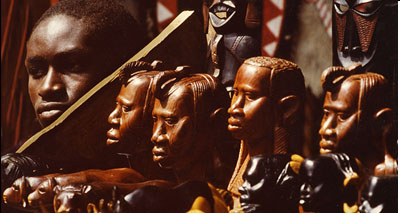How To Write About Africa
Published
in the early 2000s, in one of DFID’s Development
Issues [a mini-magazine tracking
stories from around the world where development is actually taking place in
spite of bottlenecks], Binyavanga Wainana
exposed the clichés and stereotypes non-African writers employ all too often
when they set oput to describe the continent.
Gloria’s Scoop has gone back in time, to
reproduce a section of the Article, courtesy of The Developments…
 |
| Africans |
Always
use the word “Africa” or “Darkness” or “Safari” in your title. Subtitles may include
the words “Zanzibar”, “Masai”, “Zulu”, “Zambezi”, “Congo”, “Nile”, “Big”,
“Sky”, “Shadow”, “Drum”, “Sun” or “Bygone”.
Also useful are words like such as “Guerrillas”, “Timeless”, “ Primodial” and “Tribal”. Note that “People” means Africanswho are not black, while “The People” means black Africans.
Also useful are words like such as “Guerrillas”, “Timeless”, “ Primodial” and “Tribal”. Note that “People” means Africanswho are not black, while “The People” means black Africans.
Never
have a pictiuire of a well-adjusted African on the cover of your book, or in
it, unless that African has won the Nobel Prize. An AK-47, prominent ribs,
naked breasts – use these. If you must include an African, make sure you get
one in Masai or Zulu or Dogon dress.
In your
text, treat Africa as if it were one country. It is hot and dusty with rolling
grasslands and huge herds of animals and tall, thin people who are starving. Or
it is hot and steamy with very short people who eat primates. Don’t get bogged
down with precise descriptions. Africa is big: fifty-four countries , 900
million people who are too busy starving and dying and warring and emigrating
to read your book.
The
continent is full of deserts, jungles, highlands, savannahs and many other
things, but your reader doesn’t care about all that, so keep your descriptions
romantic and evocative and unparticular.
Make
sure you show how Africans have music and rhythm deep in their souls, and eat
things no other humans eat. Do not mention rice and beef and wheat; monkey
brain is an African’s cuisine of choice, along with goat, snake worms and grubs
and all manner of game meat. Make sure you show that you are able to eat such
food without flinching, and describe how you learn to enjoy it – because you
care.
Taboo
subjects: ordinary domestic scenes, love between Africans (unless a death is involved),
references to African writers or intellectuals, mention of school-going
children who are not suffering yaws or Ebola fever or female Genital
mutilation.
Throughout
the book, adopt a sotto voice, in conspiracy with the reader, and a sad
I-expected-so-much tone. Establish early on that your liberalism is impeccable,
and mention near the beginning how much you love Africa, how you fell in love
with the place and can’t live without her.
Africa
is the only continent you can love – take advantage of this. If you are a man,
thrust yourself into her warm virgin forests. If you are a woman, treat Africa
as a man who wears a bush jacket and disappears off into the sunset. Africa is
to be pitied, worshipped or dominated. Whichever angle you take, be sure to
leave a strong impression that without your intervention and your important
book, Africa is doomed.
Your
African characters may include naked warriors, loyal servants, diviners and
seers, ancient wise men living in hermitic splendor. Or corrupt politicians,
inept polygamous travel-guides, and prostitutes you have slept with.
The Loyal
Servant always behaves like a seven-year-old and needs a firm hand; he is scared
of snakes, good with children, and always involving you in complex domestic
dramas. The Ancient Wise Man always comes from a noble tribe (not the
money-grubbing tribes like the Gikuyu, the Igbo or the Shona). He has rheumy
eyes and is close to the Earth.
The
Modern African is a fat man who steals and works in the visa office, refusing
to give work permits to qualified Westerners who really care about Africa. He
is an enemy of development, always using his government job to make it
difficult for pragmatic and good-hearted expats to set up NGOs or Legal
Conservation Areas. Or he is an Oxford-educated intellectual turned
serial-killing politician in a Savile Row suit. He is a cannibal who likes
Cristal Champagne, and his mother is a witch-doctor who really runs the
country.
Among
your characters you must always include The Starving African, who wanders the
refugee camp nearly naked, and waits for the benevolence of the West. Her
children have files on their eyelids and pot-bellies, and her breasts are flat
and empty. She must look utterly helpless. She can have no past, no history;
such diversions.


Comments
Post a Comment